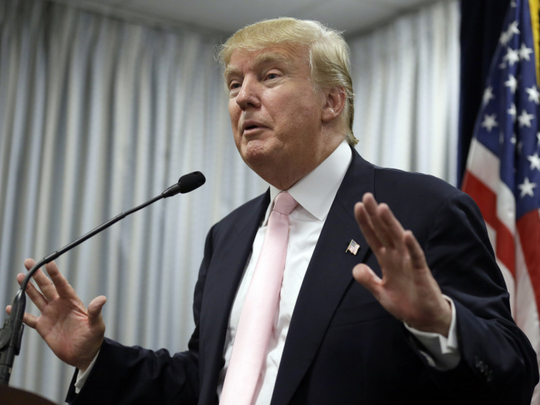
Donald Trump and Jeremy Corbyn should get together. Trump wants to grab the Republican presidential nomination from the Neanderthal right. The would-be leader of Britain’s opposition Labour party hails from the hard, socialist left. They are seriously destabilising their respective parties. And they have more in common than either would care to admit.
The billionaire Trump has leapt to the front of the Grand Old Party’s (GOP) 16-candidate primary race for next year’s election for the White House. A poll released this week by the Washington Post and ABC gave him the support of 24 per cent of Republican and Republican-leaning voters. This for a candidate whose reactionary xenophobia can make the Tea Party sound liberal. On planet Trump, immigrants from Latin America and Mexico are rapists, criminals and drug-dealers, Senator John McCain is not a war hero because he was captured by the Vietnamese, same-sex marriage and abortion are anathema, China is an enemy and climate change a hoax.
If this has discombobulated mainstream Republicans, Corbyn has stirred blind panic in the upper reaches of Britain’s opposition Labour party. Ed Miliband, the former leader, left his party in ruins after a crushing defeat at the hands of David Cameron’s Conservatives in last May’s election. Corbyn, who this week opened a poll lead over the three other putative Labour leaders, would reduce to ashes what remains.
Unlike Trump, Corbyn wants to put up taxes, particularly on the rich. He would lead a crusade against global corporations. Trump, one assumes, is just the sort he has in his sights. At home, Corbyn would nationalise strategically-important industries, slash spending on defence, lend support to Sinn Fein’s campaign for a united Ireland, increase welfare benefits and jettison austerity. He never fails to mention he opposed the Iraq war, though gets cross when reminded he once referred to Hezbollah and Hamas as “friends”.
To be fair, Corbyn has espoused such policies for the 30-odd years he has sat on his party’s backbenches in parliament. Until now, no one has ever imagined that he might one day emerge as a contender for the leadership.
Corbyn has nothing of Trump’s wealth. While the latter takes pride in belligerent vulgarity, his British counterpart, by and large, is softly spoken. Trump sports the world’s worst “comb-over”; Corbyn has swapped the traditional jeans-and-T-shirt uniform of the left for a summer suit and Panama hat. Trump looks for enemies; Corbyn pretends that, given the chance, he would charm the despots and tyrants of the world into embracing peace, prosperity and equality.
Insurgencies against the elite
And yet. You can still hear the echoes across the Atlantic. The plutocrat and the self-styled tribune of the people are in the same business of politics as protest. They have put themselves at the head of insurgencies against the elites. If Trump’s niche is nativist prejudice and Corbyn’s self-righteous indignation, they both play to popular resentments instead of offering answers. Trump’s unabashed narcissism finds a subtle counterpart in Corbyn’s claim never once to have sullied his principles.
The two also hold up a mirror to their respective parties. Trump has prospered of the company he is in. The very fact that 16 candidates have thrown their hats into the Republican ring is telling. Jeb Bush, Scott Walker, Marco Rubio and the rest — they all have their champions, but none has made a compelling bid. The GOP can win the House and the Senate, and sweep the board in state elections, but picking a presidential candidate opens up the fissures and fractures between realist party establishment and hard-right grass roots.
Flawed conclusion
Among the others in the Labour contest only the centrist Liz Kendall has stepped out of the party’s comfort zone by saying it must explore why it had been deserted by middle-of-the-road voters. Such daring has left her trailing in fourth place. Andy Burnham and Yvette Cooper, the self-declared mainstream contenders, have so far said nothing of any note.
As with the Republican primary, the race is being shaped by the activists. Miliband’s delusion was to think he could oust Cameron by lurching to the left. The voters decided otherwise. Incredibly, many Labour members have drawn the conclusion that the mistake was to have been insufficiently socialist.
Odd bedfellows as they may seem, Messrs Trump and Corbyn share more than the fragilities of their parties. Strip out the policy specifics and they carry the same core message to the disenchanted and disgruntled: we can stop the world and get off. In Trump’s case, the enemies are immigrants, China and anyone who does not do what the US says; in Corbyn’s they are global capitalism and American militarism.
Look across Europe and you see the same marriage of far left and right: a shared populism that plays to the anger and frustration of electorates battered by recession and by the economic and physical insecurities of globalisation. This is politics without answers, but it has been winning votes for the National Front in France, Syriza in Greece and the Five Star Movement in Italy.
The odds are the Republicans and Labour will shake off their collective madness, leaving Messrs Trump and Corbyn on the sidelines. But the anger and mistrust that have put them in lights have become a dangerous fact of modern democratic politics.
— Financial Times









